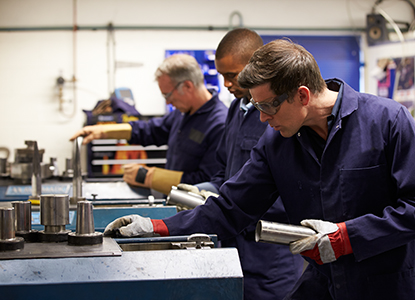By Richard Johnstone | 29 April 2014
The economy grew by 0.8% in the first quarter of 2014, meaning the rate of expansion has quickened compared to the last three months of 2013, figures from the Office for National Statistics revealed today.

However, the economy remains 0.6% below the peak prior to the financial crisis, the preliminary estimate of gross domestic product found.
The growth in output was driven by increases in both the service sector (up 0.9% compared to the previous quarter), and the production sector (up 0.8%). In addition, although the construction sector grew by 0.3%, the ONS said there was some evidence to suggest output was affected by the storms and high rainfall in January and February. However, over the quarter, the storms have not had a significant impact on GDP growth as a whole, the report concluded, and they will not be classed as a statistical special event.
Responding to the figures, Chancellor George Osborne said they showed Britain was recovering.
‘We have to carry on working through our long-term economic plan,’ he added.
‘For the first time in a decade all three main sectors of the economy – manufacturing, services and construction – have grown by at least 3% over the last year.
‘The impact of the Great Recession is still being felt, but the foundations for a broad based recovery are now in place.’
Examining the figures, the Centre for Economics and Business Research said that the underlying economic picture could be even stronger than the data suggested, if construction output had been affected by the severe winter.
Managing economist Scott Corfe said it was likely the economy would surpass the pre-crisis peak in the second quarter.
‘The construction sector is likely to see strong growth in the remainder of 2014, supported by a sharp increase in housebuilding,’ he added.
‘Leading indicators continue to suggest that the economic recovery has gained significant momentum at the start of the year.
‘With unemployment falling and earnings growth picking up, there is room for consumer spending to expand without households necessarily becoming more indebted. In addition, a wide range of measures of business confidence stand at high levels and suggest that business investment will grow relatively strongly this year.’
Shadow chancellor Ed Balls said ‘a balanced recovery’ was needed.
‘David Cameron and George Osborne want to tell people the cost-of-living crisis is over, but millions of hardworking people are still feeling no recovery at all,’ he added.
‘Under this government, wages after inflation are down by over £1,600 a year. On top of this, tax and benefit changes will leave families almost £1,000 a year worse off by the time of the next election. And with business investment still weak, infrastructure output down and housing demand outstripping housing supply, this is not yet a recovery that is built to last.’





















